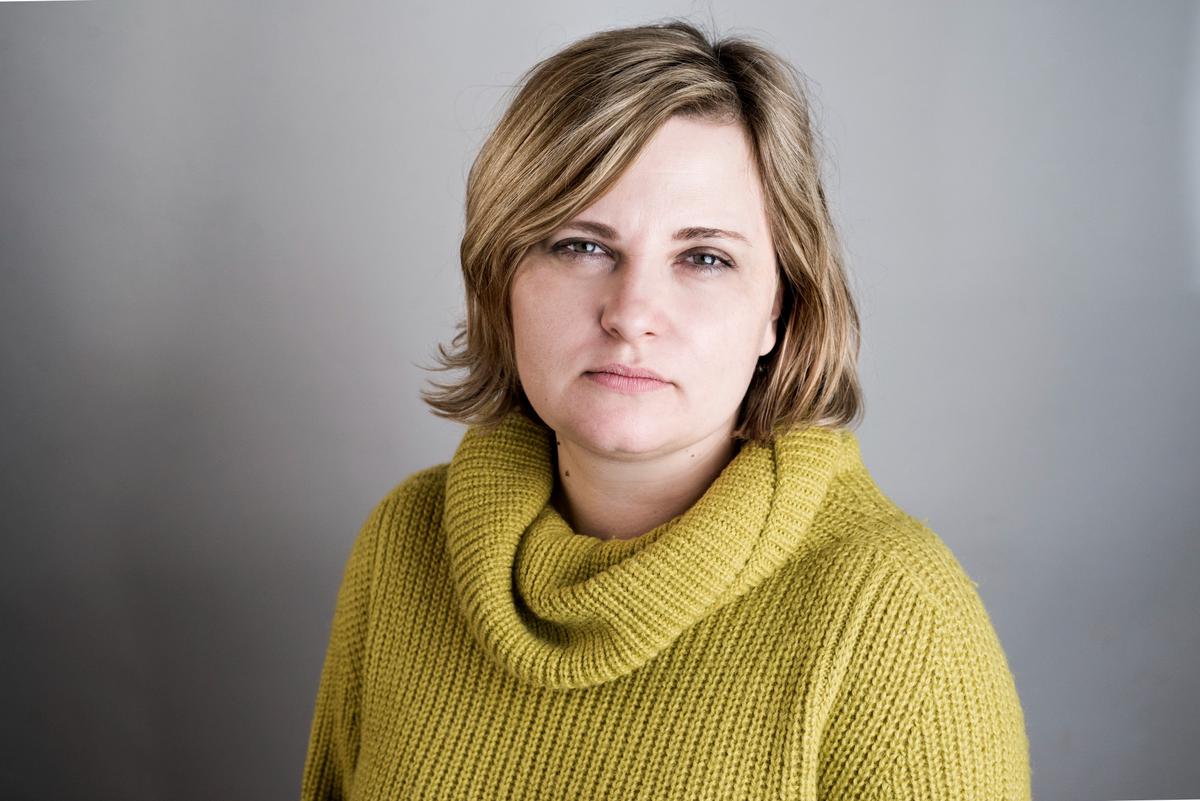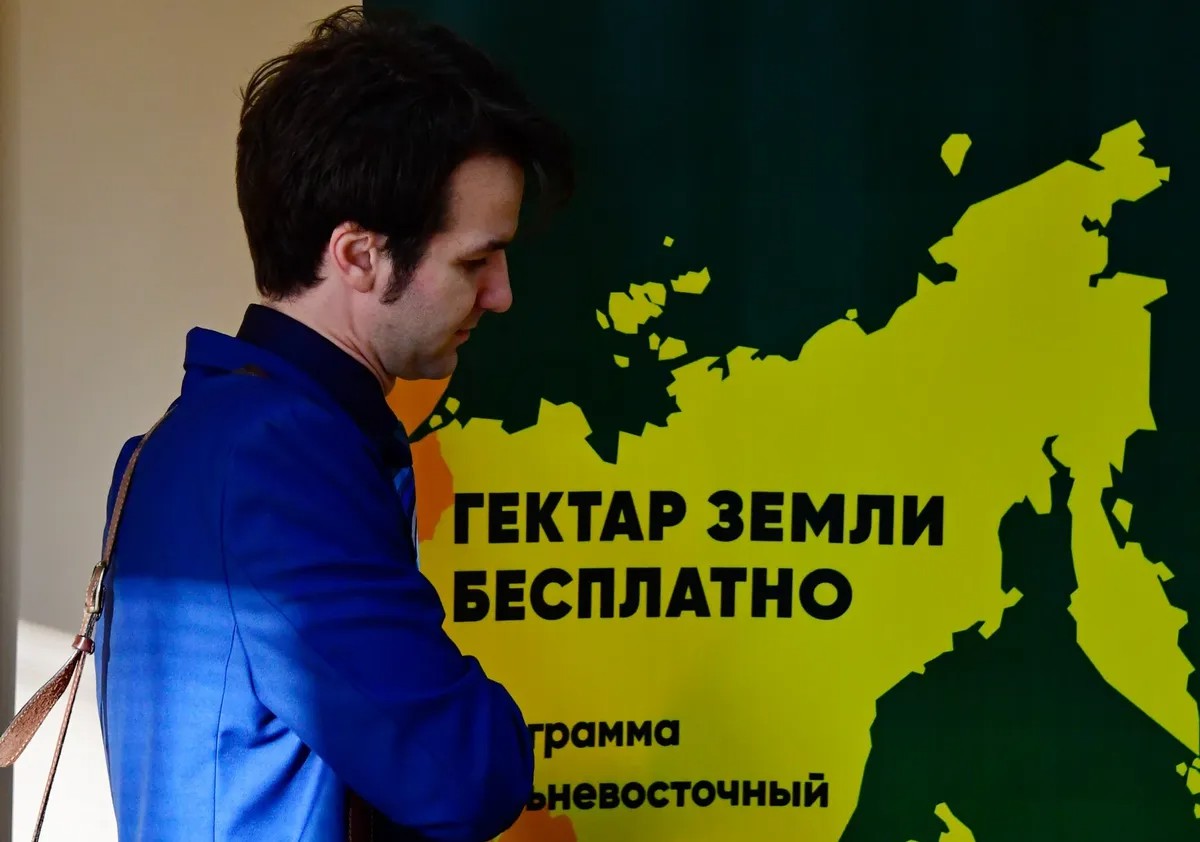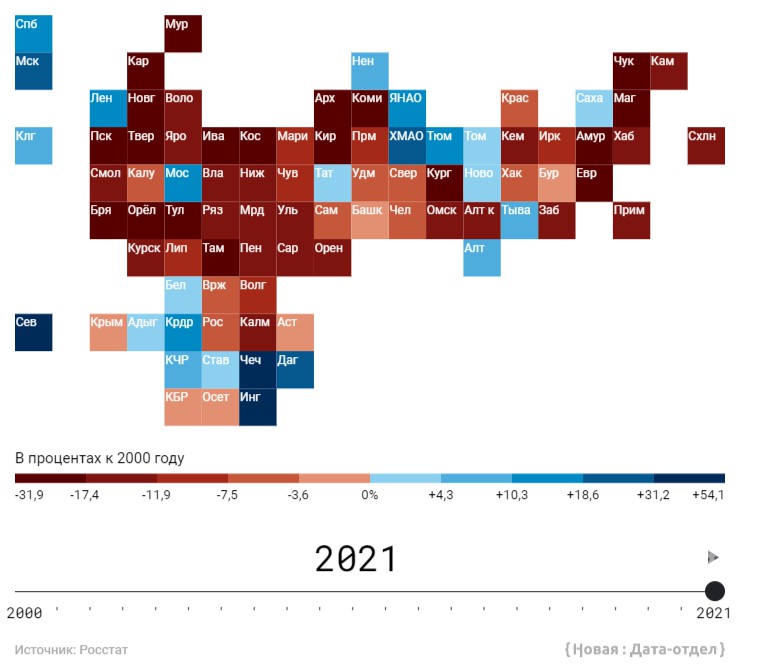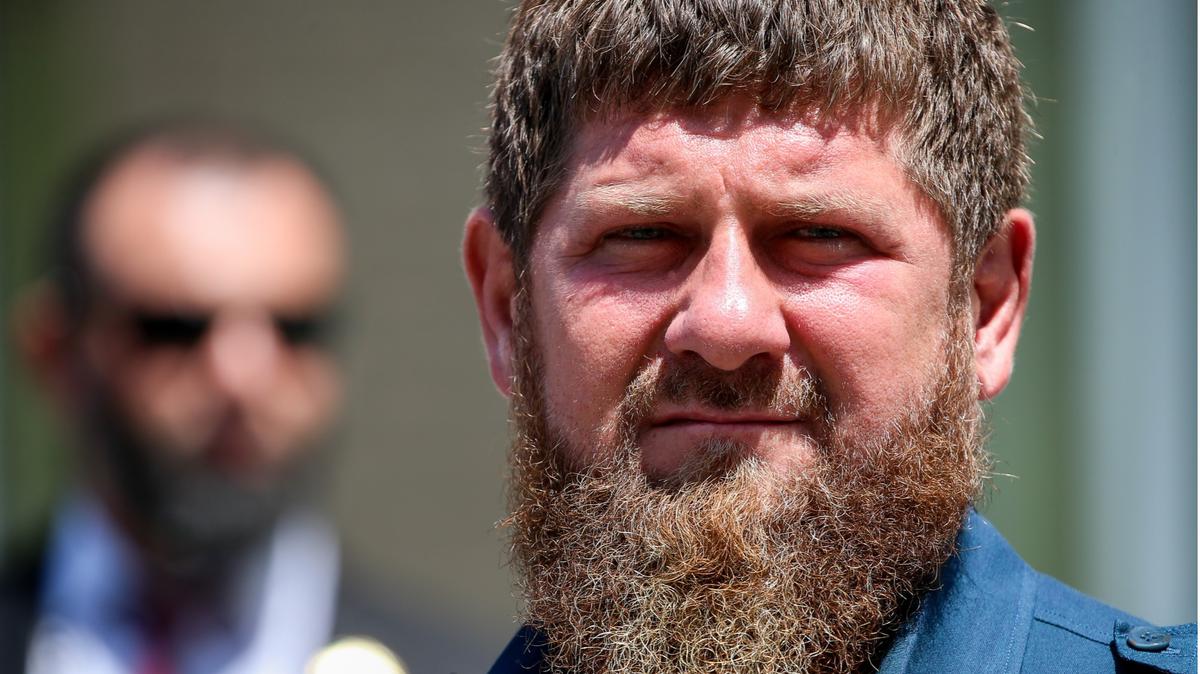Here what’s in store for you this week:
- Our investigative reporter Elena Milashina was forced to leave Russia after being branded a “terrorist” by a powerful official. We share the most powerful quotes from her interview for our “What’s new?” podcast;
- We explain how the Far Eastern city of Irkutsk became Russia’s crypto mining capital, and why the bitcoin mined there ends up being transferred to China;
- It’s been 5 years since the Russian government launched the ‘Far Eastern Hectare’ scheme. We report on how it’s not all it was cracked up to be;
- Plus, we breakdown the figures behind Russia’s drastic demographic decline.
Novaya’s Elena Milashina Forced to Leave Russia
You may remember that last week’s edition of Russia, Explained featured reporting on Head of Chechnya Ramzan Kadyrov’s vendetta against the family of former judge Saidi Yangulbayev by our correspondent, Elena Milashina. Following those reports, Kadyrov made several personal threats against her, branding her a “terrorist”. A powerful Russian official has also been attacking Novaya as a whole, demanding that a criminal case be opened against us. Because of this, our editorial team made the decision to send Milashina abroad for her own safety. You can read our full statement on the decision here. Before her departure, Milashina came on our podcast “What’s New?” to discuss her perspective on what’s happening in Chechnya, as well as the fate of Yangulbayev’s wife, Zarema Musayeva, who was detained and forcibly returned to the republic. We highlight some of Milashina’s most powerful quotes from the episode.

Rlrnas Milashina. Photo by Anna Artemeva / Novaya Gazeta
ON THE “WOLVES CREED” TELEGRAM CHANNEL. Kadyrov’s hatred of the Yangulbayev family stemmed from the participation of the judge’s son — Ibragim — in the “Wolves Creed” Telegram channel which shed light on the many human rights abuses committed by the Chechen authorities. After imprisonment and torture, he has since fled Russia and now operates the channel from abroad. Of its success, Milashina says:
“They have a huge number of sources and cover almost all of Chechnya. So if the channel is talking about a particular district, even a village, they can find information about how many people were, say, illegally detained in that district […] They have a large database of information in Chechnya and they train people, especially young people, on how to get information about what is happening in Chechnya and to make it public.”
ON REINFORCING STEREOTYPES. The Chechen authorities are digging their own grave, says Milashina:
They “do not realise that with each step they take they make their attitude towards Chechnya and the Chechen people even worse. What is happening now is an absolutely barbaric violation of all the foundations of, Chechen, Caucasian and Muslim society.”
…AND ON TRYING TO BREAK THEM DOWN:
“I am doing everything I am doing so that the citizens who live in Russia understand that the people in the Chechnya region are still enduring Stalinist times.” She adds that she aims to help citizens outside of Chechnya “not to associate Chechen people with that small handful of people who hold the power there.”
ON THE FATE OF ZAREMA MUSAYEVA. While the publicity around the case may afford her some protection, Milashina worries for Musayeva’s safety since women held hostage by the Chechen authorities often suffer rape as well as beatings:
“[In Chechen culture] a woman is a saint and must not be touched. According to Islam, one must not look at a strange woman, much less beat her. Rape is what is happening now and it is an absolutely barbaric violation of all the foundations of both Chechen and Caucasian and Muslim society.”
ON PUTIN’S SILENCE. The attempted detention of Judge Yangulbayev and the successful detention of his wife show the complicity of the Russian federal authorities in Kadyrov’s campaign of persecution. Of the Kremlin’s failure to reign him in, Milashina says:
“The longer Putin doesn't say anything, the more emboldened Kadyrov becomes, the more barbaric his statements and those of the security officials nearest to him.”
She adds that the Kremlin’s disregard for violations committed by the Chechen authorities belies their own insistence that Chechnya is an inalienable part of Russia.
“It's a demonstration that one and a half million people of Chechen ethnicity are not really citizens of the country. Then, wait a minute, what kind of territorial integrity are you talking about? You're dividing the people yourselves […] You can't separate Chechen people from Russia like this. Everyone is protected, or no one is protected, or no one is protected.”
BACKSTORY. Ramzan Kadyrov has been the Head of the Chechen Republic since 2007 and has gained a reputation for ruthlessness and political repression. He is the son of former Chechen President Akhmed Kadyrov, who was assassinated in 2004. He is a staunch supporter of President Putin, while also building his own power base and personality cult. He is considered by many as the second most powerful politician in the Russian Federation, and has frequently styled himself as the representative of the country’s some 20 million Muslim citizens. Many of those who have dared to oppose him have ended up in prison or murdered. He is, for example, widely believed to be behind the murder of human rights campaigner Natalia Estemirova in 2009. He has also presided over the systematic persecution of LGBTQ+ people in Chechnya, infamously claiming that the republic has “no gay people.”
You can listen to Milashina’s podcast interview in full here.
Поддержите
нашу работу!
Нажимая кнопку «Стать соучастником»,
я принимаю условия и подтверждаю свое гражданство РФ
Если у вас есть вопросы, пишите [email protected] или звоните:
+7 (929) 612-03-68
Far Eastern Hectare Scam, Explained
The Russian Government launched the Far Eastern Hectare scheme with much fanfare back in 2016. At first only available to residents from the region, by 2017 every Russian citizen could receive one free hectare of land in the Far Eastern Federal District. Citizens can choose their plot of land at nadalniyvostok.rf. It is a move reminiscent of the 1862 Homestead Act in the United States which sought to attract settlers to less populous areas of the country with the promise of free land. 220 million hectares are up for grabs under the modern Russian scheme, twice the amount made available by the Homestead Act. As of February 2 this year, 100,129 people had signed up to the scheme. Oleg Kuchma, a lawyer from Vladivostok, is just one of them. He tells Novaya about his experience with the scheme, showing that it’s not all it’s cracked up to be.

A man near the agitation paper about the free hectar state program. Photo: Yuri Smituk / TASS
OLEG’S HECTARE. This is not the first time that Oleg’s hectare has made the news. In 2019, he and his seemingly idyllic plot appeared in reports by the BBC, France 24, and The Wall Street Journal. Situated in a picture-perfect clearing overlooking Ussuri Bay, he could have been the scheme’s poster child. The reality, however, was not so pretty. Firstly, it took him more than six months to be able to access his land after registering. In the village where it is located, there is a shipyard owned by a former local politician who did not want anyone encroaching on his territory. Secondly, there was no electricity. His plot was nearly a kilometre away from the nearest power source, and establishing a connection would cost thousands of roubles.
DISGRUNTLED OFFICIALS. The local administration — who had been making a tidy profit from selling plots of land in the area — were not happy with the hectare scheme. In retaliation, they established absurd regulations about what scheme participants could do with their land. In Oleg’s case, he was told he could only build a police station, a fire station, a clinic, a landfill, or a public toilet. He opted for the toilet. But when he submitted the required documents, the rules changed again. The local administration told him he could only build a dog breeding school. The staff they sent to review the site declared that Oleg’s failure to properly weed his plot posed a danger to local animals. They fined him 2,000 roubles.
BUREAUCRATIC HURDLES. The government mandates that scheme participants must prove that they are doing something productive with their hectare. Oleg reports that the online system for registering this proof is full of glitches, that it is only possible to upload documents once the deadlines have passed. If the required proof is not provided, the State reserves the right to repossess the hectare.
RUSSIA IN A NUTSHELL. The free land is not really free, writes Oleg. If you acquire a hectare in a woodland area, you’ll have to pay several thousand for permission to cut down the trees, then another several thousand for a building permit… the list goes on. Plus, you can never be sure that you actually own the hectare since — at any time — the local authorities can decide that the site has not been used productively and repossess it. “Personally, I’m happy that I didn’t spend money on electricity or a road, and that I only blew 100 thousand roubles for a well”, Oleg dryly concludes “Once again, I have understood everything about this country.”
BACKSTORY. Russia’s colonial designs on the Far East are centuries old. From Ivan the Terrible to Joseph Stalin, its rulers have expanded eastward, disregarding the local indigenous populations to extract natural resources, build vast prison systems, and assert Moscow’s authority. President Putin, who has made developing the region one of his top priorities, is part of this long imperial tradition. After the Soviet Union’s collapse, thousands abandoned the region for the economic opportunities of Russia’s Western regions. The Far Eastern Federal District accounts for 41% of Russia’s landmass, but just 6% of its population. It loses 17,000 inhabitants a year on average. The Far Eastern Hectare is a — so far not very successful — bid to change that.
Read Fedorenko’s full report here.
How Irkutsk Became Russia’s Crypto Capital
In the last few years, cryptocurrencies have never been far from the headlines. Last month, Russia’s Central Bank proposed banning the use, and mining, of any cryptocurrency, citing threats to financial stability, citizens' wellbeing and its monetary policy sovereignty. It’s no wonder they are concerned: Russia is the world’s third largest source of mines following China and the United States. Our special correspondent Irek Murtazin flew to Irkutsk to visit a crypto mine, and to find out why this region has become a “crypto-klondike”.
WHAT IS CRYPTO MINING? Put simply, crypto mining is the process of generating new units of a cryptocurrency. Cryptocurrencies luse distributed public ledgers to record all financial transactions. The ledger is public so each record needs to be validated in order to prevent fraudulent transactions. Validation involves solving a complex mathematical problem. A network of computers compete to solve the problem. The computer (miner) that solves the problem first earns the right to post the transaction in the ledger and gets a financial reward, typically paid in cryptocurrency.
WHY IRKUTSK? The process described above takes energy — lots of it. The computers require large amounts of electricity to perform the operation which, in turn, produces large amounts of heat. The need to cool them down leads to even greater energy consumption. For example, a Russian-controlled crypto mining broke the energy grid in Abkhazia, a Russia-controlled breakaway region of Georgia. So no surprise that few countries welcome the miners. In 2021, China banned crypto mining and much of the equipment made its way over the Russian border — most of it ended up in Irkutsk Oblast. It’s little wonder that the heart of Russia’s famously chilly Siberia — with its cheap electricity tariffs — is attractive to those who want to get rich on crypto mining.
TIME TO PANIC? Regional authorities sounded the alarm last autumn, with governor Igor Kobzev writing a letter to Russian Deputy Prime Minister Alexander Novak, reporting that energy consumption in the region had increased by 159 percent compared to 2020 due to crypto mining. "They shamelessly take advantage of the fact that we have low electricity tariffs in the region”, wrote Kobzev, suggesting introducing differentiated electricity tariffs for the population.
NOT EVERYONE AGREES. Kobzev’s anxiety is not shared by all. Denis Martynyak, a member of the expert group under the State Duma of Russia on regulating mining and the cryptocurrency market, tells Murtazin:
“Of course, there is a problem, but it is not as acute, not as big as it is presented. There is mining in private homes, but there is also mining done by law firms, and they pay normal rates for electricity. These miners do not bother either the authorities or the power engineers […] This looks like a bid by the governor to raise electricity tariffs, which have not been raised in the Irkutsk region for a long time.”
Aleksei Zhemchuzhnikov, a member of Irkutsk’s public chamber, shares this view:
“I am against differentiated tariffs […] We don’t even have an official concept of what mining is.” He points out that anyone with a mobile phone or a computer can technically do their own crypto mining. “So, what now?” he asks “Should everyone who has computers and mobile phones, be recorded as miners?
USEFUL SCAPEGOATS? Martynak tells Murtazin that Irkutsk authorities are deliberately demonising crypto miners in order to shift blame away from themselves after major infrastructural failures. In December last year, there was a power outage on a 256-kilometre high-voltage line connecting the Ust-Ilimsk hydroelectric power station with a substation in Bratsk. Two passenger trains were unable to move and 67 thousand people were left without power. “The population is taught to think that miners are to blame for all accidents”, says Martynak.
BACKSTORY. Cryptocurrencies have been recognised in Russian law since 2020, but they operate in a legal grey zone. They have been permitted in Russia since January 2021 — but cannot be used to purchase goods and services. This means Russians can mine, trade and hold cryptocurrencies — but using them is illegal. While the idea of recognising crypto mining as a legitimate business activity has been gaining traction in some quarters, the Central Bank continues to oppose the free circulation of cryptocurrencies in the Russian economy.
Read Murtazin’s full report here.
Bonus Round
2.4 million people died in Russia in 2021 — 1 out of 4 of these deaths was a result of Covid-19. Antonia Asanova breaks down the data on Russia’s plummeting population
How has the population of Russia changed

The shocking statistics represent the greatest decline in the country’s population since World War II. Mortality rates in central regions such as Ryazan, Novgorod, and Tula were particularly high, with 1 in every 50 people in these oblasts dying in 2021. While Russia has lost almost 670,000 lives to Covid-19, the virus is just the tip of the iceberg when it comes to population decline. The pandemic simply exacerbated the exodus of people from Central Russia due to the excessive economic centralisation introduced by President Putin. Demographer Alexei Rashka adds that — since opportunities are concentrated in Moscow and St. Petersburg — thousands of young people have left the provinces, leaving behind a disproportionately elderly population which — of course — increases the mortality rate. Russian authorities recognise the challenges posed by a shrinking population, and regularly announce measures to increase life expectancy and birth.
This newsletter drop is written and edited by several journalists at the Novaya Gazeta newsroom. Please, support our work by promoting our newsletter with #RussiaExplained hashtag on social media.
To keep up with Novaya Gazeta’s reporting throughout the week, you can follow us on Facebook, Twitter, Instagram, and Telegram. Our video content is available on Youtube and don’t forget to visit our website for the latest stories in Russian.
The Novaya Gazeta Team
